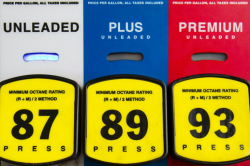
— Is premium gas worth the extra cost? Probably not, at least according to research conducted by the American Automobile Association (AAA).
Researchers used vehicles of the same makes and models and compared what happened to the vehicles when using premium versus regular gas by testing horsepower, emissions and fuel economy data in a lab under different driving conditions. All the vehicles were sold without any recommendations or requirements to use premium fuel.
Researchers confirmed what previous researchers have found: Using premium gas when it's not required by an automaker does nothing to help with horsepower, fuel economy or emissions.
Considering some gas stations charge an additional 20 to 30 cents per gallon for premium gas, AAA estimates consumers throw away more than $2 billion each year to pay for fuel that does nothing good for their cars. This equates to more than 16 million drivers unnecessarily throwing out money for premium gas in the last 12 months, money that could be better spent elsewhere.
And then there is the magic word, "octane." While many consumers put a lot of stock in octane ratings, it has nothing to do with the quality of the fuel because the octane number is simply a measure of the compression ratio in fuel.
For example, some sports or luxury cars may use high compression engines that require premium high-octane fuel to keep the engines from knocking. In short, if your car requires premium gas, pay the extra money and use premium or face a knocking engine.
In addition to octane doing nothing concerning the quality of the gas, using a high-octane gas won't do anything to keep the engine clean and won't prevent engine deposits from building up.
As for those octane ratings, pulling into most gas stations means seeing a pump with three choices of gasoline: regular, mid-grade and premium, with typical octane ratings of 87 (regular), 89 (mid-grade) and 93 (premium).
However, octane ratings can be different based on what state you are in, where in one state a minimum octane rating of 90 will qualify as "premium" fuel, while another state may require a rating of 92 or 93 for the gas to be sold as premium.
According to AAA, 70 percent of drivers own a vehicle that requires regular gasoline (87 octane), while 16 percent of vehicles require premium gas and 10 percent of the cars do better with a mid-grade fuel. The remaining 4 percent of vehicles in the U.S. use alternative energy sources.
If you're confused about which gas to use, the best thing a car owner can do is read the owner's manual that describes what octane fuel is recommended. If by some chance the car knocks when the recommended octane is used, try switching to a higher octane to determine if the knocking disappears.




